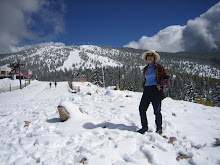A Road Most Brutal
I've just finished Cormac McCarthy's novel The Road, and it is one of those books that I can't stop thinking about. It felt intensely grim, and while not exactly a fun read, it was impossible to put down. McCarthy's bleak post-apocalyptic vision depicts life after "the end," a scenario in which civilization is a distant memory and nearly all living things are dead. The narrator is a father. The world has been bombed or burned nearly into oblivion. It is bleak, wintery and dangerous, but he is determined to keep walking until he and his young son reach the sea, the edge of the country. A few others skulk about in the burned out ruins, theives and cannibals, and the father must avoid these thugs. The love between the survivalist father and his son, their surprising ability to continue, and the father's ultimate surrender, gave the novel a redemptive quality. I found it strangely uplifting.
McCarthy's The Road inspired me to reflect on the World War II letters home that served as the basis for my last two books, From Calcutta with Love and Beast of Bengal. Much of the CBI arena of WWII was bleak and horrific. General Joseph Stillwell called the China India Burma theater a scene of "uncommon misery" and noted that it had "the worst diseases and the worst weather in the world." These conditions inspired some of the most beautiful wartime correspondence that I've discovered. All of this speaks to the human spirit's ability to transcend.






